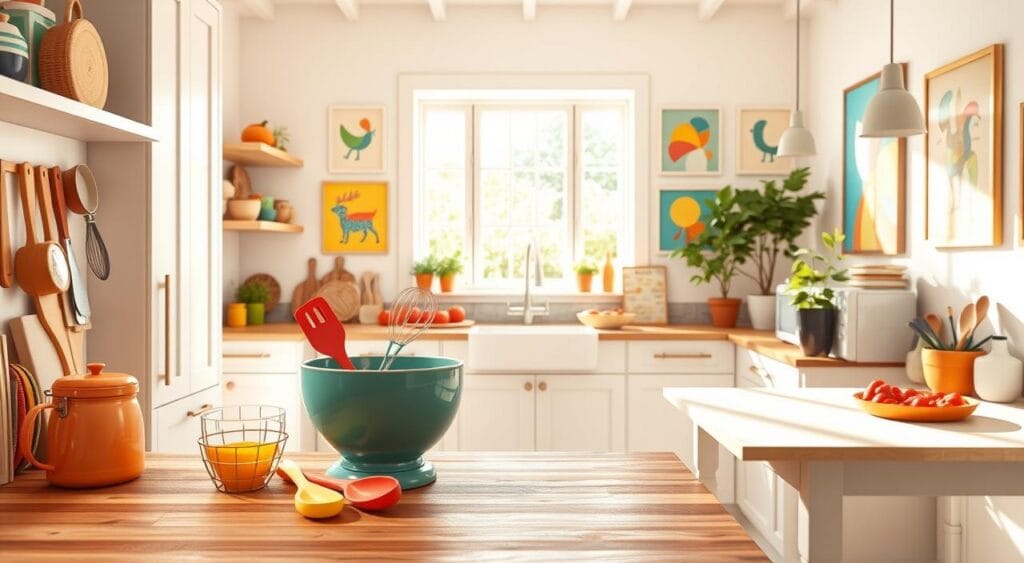Turning your home into a happy place is simpler than you might think. By using dopamine décor ideas, you can make your space more joyful and better for your health.
Your kitchen is often the centre of your home. With a few easy changes, you can make it a place of joy. Dopamine décor is about making spaces that make you feel happy and content.
Using home design tips that focus on happiness can make your kitchen both lovely and uplifting. In this article, we’ll look at some easy ways to start making your kitchen a happier place.
The Science Behind Dopamine Décor
The science of dopamine décor shows how our surroundings shape our mood. Our environment greatly influences our feelings. Knowing this helps us design spaces that make us happy.
How Your Environment Affects Your Mood
The places we live in can really change how we feel. Studies in environmental psychology show our surroundings affect our emotions. Some things can make us feel better, while others can make us feel down.

The Neuroscience of Happiness in Home Design
The science of happiness in home design is linked to dopamine. Dopamine is a chemical in our brain that makes us feel good. Things like bright colours or natural textures in our kitchens can make us feel happier by releasing dopamine.
| Design Element | Effect on Mood |
|---|---|
| Natural Light | Boosts serotonin levels, improving mood |
| Vibrant Colours | Stimulates dopamine release, making us happier |
| Clutter-Free Space | Reduces stress, making us feel calmer |
By understanding how our environment affects our mood, we can design kitchens that make us happy. This knowledge helps us make choices that create spaces that uplift us.
Understanding Your Kitchen’s Potential for Happiness
To make your kitchen a source of joy, start by checking how it works now. Look at how you use it and find ways to make it better.
Assessing Your Current Kitchen Space
Watch how you move around your kitchen. Note any spots that slow you down. Think about:
- Where big appliances are and how they affect your flow
- If you have enough storage and how it looks on your counters
- The lighting and how it makes you feel
Identifying Problem Areas and Mood Drains
After checking your kitchen, spot any parts that cause stress or discomfort. Common problems include:
Common Kitchen Frustrations in British Homes
| Frustration | Potential Solution |
|---|---|
| Limited storage | Install additional shelving or optimize existing storage |
| Insufficient lighting | Add more light sources, such as under-cabinet lighting |
| Cluttered countertops | Implement a decluttering routine and use storage solutions |
Quick-Win Opportunities for Improvement
Small changes can make a big difference. Think about:
- Changing your kitchen’s paint to a brighter colour
- Swapping old appliances for new, efficient ones
- Adding plants, like a small herb garden or potted plants
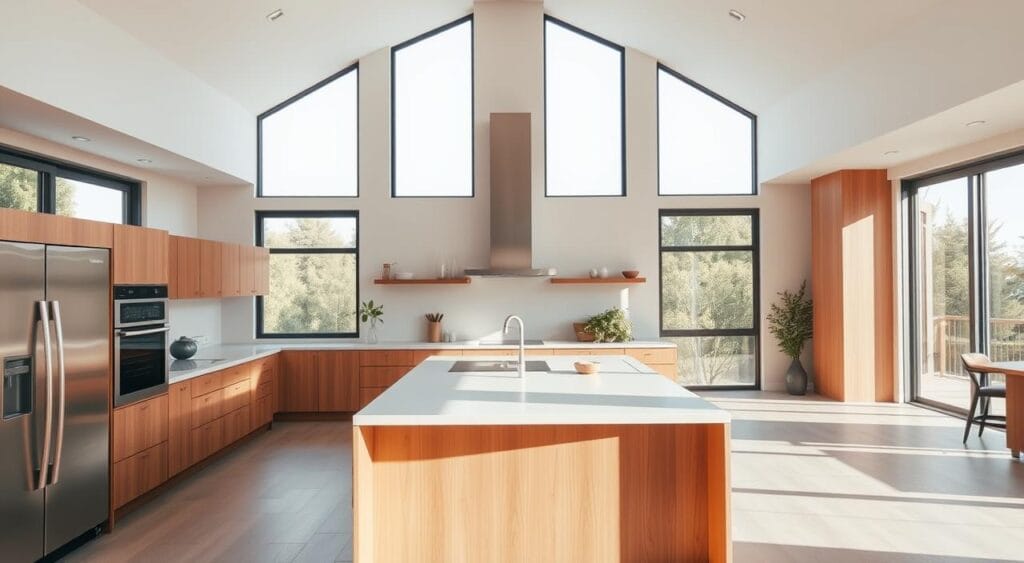
Colour Psychology in Kitchen Design
Your kitchen’s colour scheme does more than look good; it affects your mood. The colours you pick can change how you feel in your cooking, eating, and socialising area.
Mood-Boosting Colour Schemes
Choosing the right colours for your kitchen can be tricky. But knowing about colour psychology helps. Warm colours like red, orange, and yellow make you hungry and talkative. Cool colours like blue, green, and purple calm you down.
Traditional British Colour Palettes with a Modern Twist
Traditional British colours include soft tones like creams, blues, and greens. You can update these classic colours by adding bold touches or mixing them with modern designs.
| Traditional Colour | Modern Twist |
|---|---|
| Cream | Pair with bold black accents |
| Soft Blue | Incorporate with metallic gold fixtures |
| Gentle Green | Use with crisp white cabinetry |
Accent Colours That Spark Joy
Accent colours bring personality to your kitchen and draw attention. Bright colours like yellow or orange energise you. Soft pastels, on the other hand, soothe you.
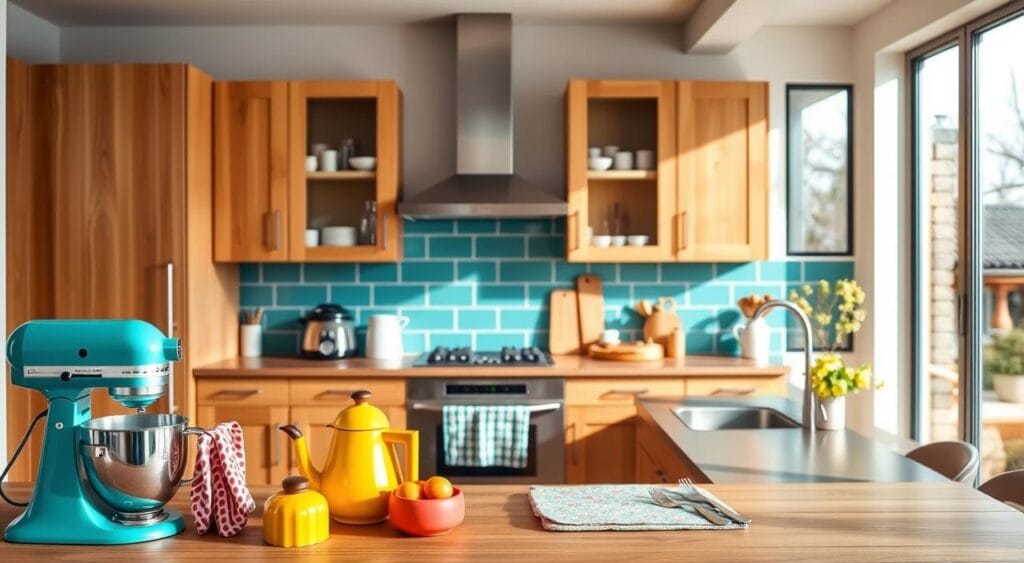
Practical Application: Painting, Tiles, and Accessories
You can use painting, tiles, and accessories to bring your colour scheme to life. Paint walls a calming colour, use tiles as a bold statement, and add colourful accessories to finish the look.
By carefully choosing your kitchen’s colours, you can make a space that’s not just beautiful but also lifts your mood and happiness.
Transformative Kitchen Lighting Solutions
A good lighting plan can change your kitchen for the better. It makes cooking more fun and efficient. The right lighting sets the mood and makes your kitchen work better.
Maximising Natural Light in British Weather
Even on cloudy days, natural light is key. Use light colours on walls and ceilings. Add skylights or bigger windows. And make sure windows are clear of clutter.
- Use lighter colours on walls and ceilings to reflect natural light.
- Consider installing skylights or larger windows to increase natural light intake.
- Keep windows unobstructed by using minimal window treatments.
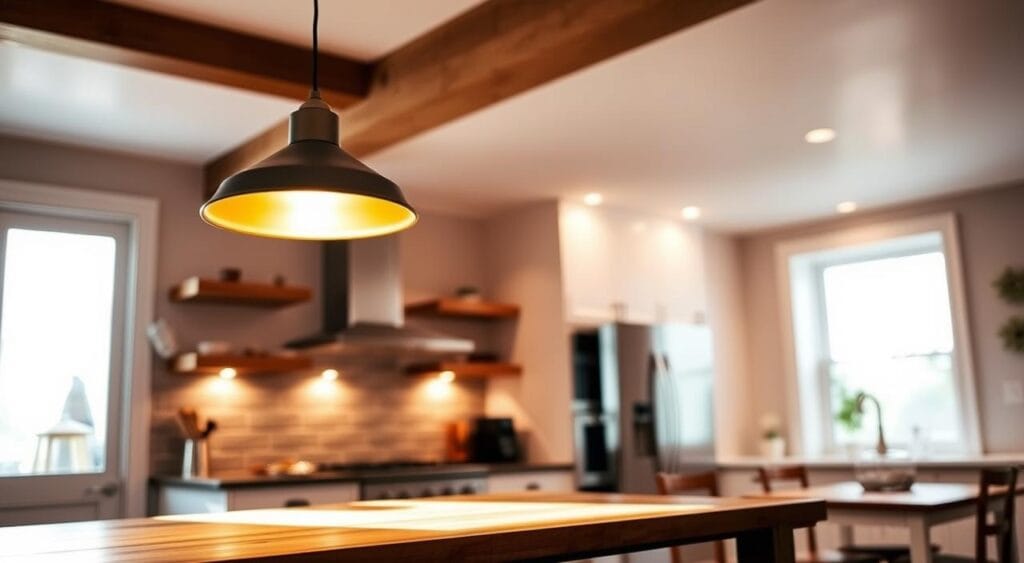
Layered Artificial Lighting Approaches
Layered lighting uses different lights to make your kitchen inviting. It includes task lights for work areas and ambient lights for the mood.
Task Lighting for Functional Happiness
Task lights focus on work areas like countertops. They help you work better and avoid eye strain.
Ambient Lighting for Atmosphere
Ambient lights create your kitchen’s mood. Use ceiling or wall lights to make it warm and welcoming.
| Lighting Type | Purpose | Examples |
|---|---|---|
| Task Lighting | Illuminates work areas | Under-cabinet lights, pendant lights over islands |
| Ambient Lighting | Sets overall mood | Ceiling fixtures, wall-mounted lights |
Energy-Efficient Options for Sustainability
Choosing green lighting saves the planet and your wallet. Go for LED bulbs and smart lighting systems.
- LED bulbs are energy-efficient and last longer than traditional bulbs.
- Smart lighting systems allow you to control lighting levels and schedules.
Decluttering Your Kitchen for Mental Clarity
Decluttering your kitchen is more than tidying up. It’s about making a space that boosts your mood and clarity. A tidy kitchen can lower stress and make cooking fun.
The KonMari Method Adapted for Kitchen Spaces
The KonMari method, made famous by Marie Kondo, works well for kitchens. It means gathering items, holding each one, and keeping only those that bring joy. In kitchens, this means sorting utensils, cookware, and gadgets, and being strict about what stays.
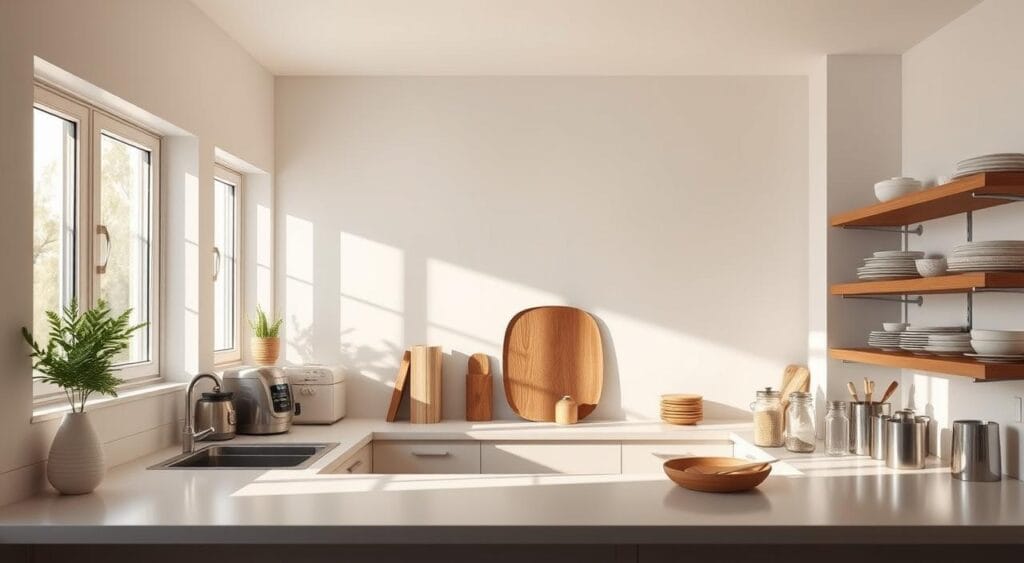
Smart Storage Solutions for British Kitchen Dimensions
British kitchens face unique space challenges. To solve this, use wall-mounted shelves, pull-out drawers, and corner cabinets. These help keep counters clear and your kitchen organised.
Daily Habits for Maintaining Order
To keep your kitchen tidy, adopt daily habits. Try the ‘clean as you go’ method. Wash utensils and clean surfaces while cooking.
The Five-Minute Tidy-Up Routine
If you’re short on time, try the five-minute tidy. At day’s end, spend five minutes putting away items, cleaning surfaces, and sweeping. This daily effort keeps your kitchen tidy and organised.
Personalising Your Kitchen Space with Meaningful Elements
Make your kitchen a mirror of your family’s story with careful décor choices. Add personal touches that hold sentimental or cultural value. This way, your kitchen will truly feel like home.
Curating Décor That Tells Your Story
Choose décor that speaks to your personal history or interests. It could be a vintage utensil, a handmade ceramic, or a family heirloom. Displaying these items in your kitchen adds character and sparks conversations.
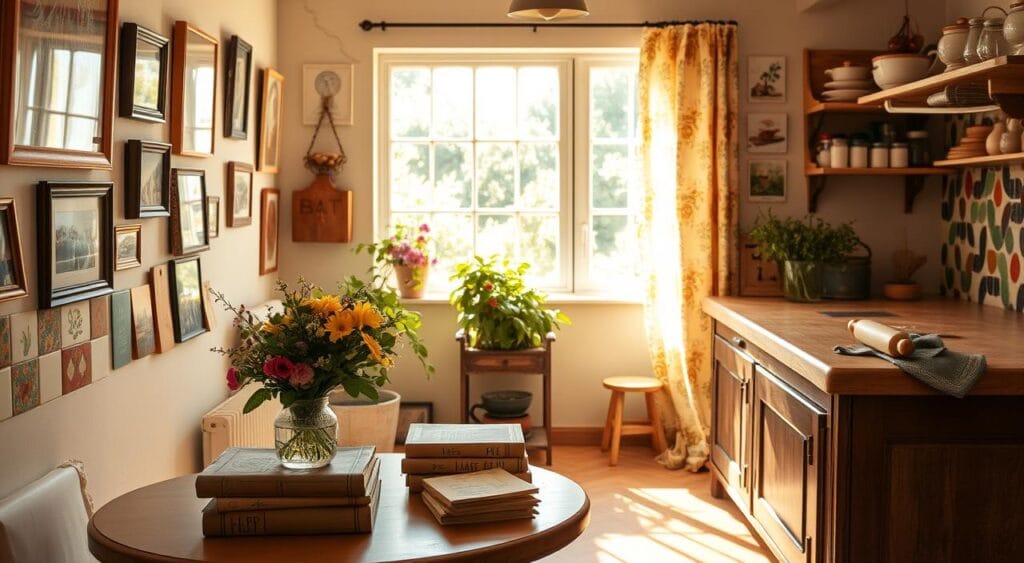
Family Photos and Artwork Display Ideas
Family photos and artwork warm up your kitchen. Create a gallery wall with framed photos, kids’ artwork, or other special visuals. Decorative plates, vintage windows, or unique items can also showcase your favourite memories.
Incorporating Heritage and Cultural Elements
Adding elements that reflect your cultural heritage makes your kitchen personal and connected to your roots. This could include traditional cookware, handmade textiles, or items that show your family’s cultural background. These elements honour your heritage and celebrate your story.
By carefully choosing meaningful elements, you can make your kitchen a warm, heartwarming space. It will reflect your family’s story and heritage beautifully.
Biophilic Design Elements for a Happier Kitchen
You can turn your kitchen into a happy place by using biophilic design. This design brings nature inside, making your space feel better and more uplifting.
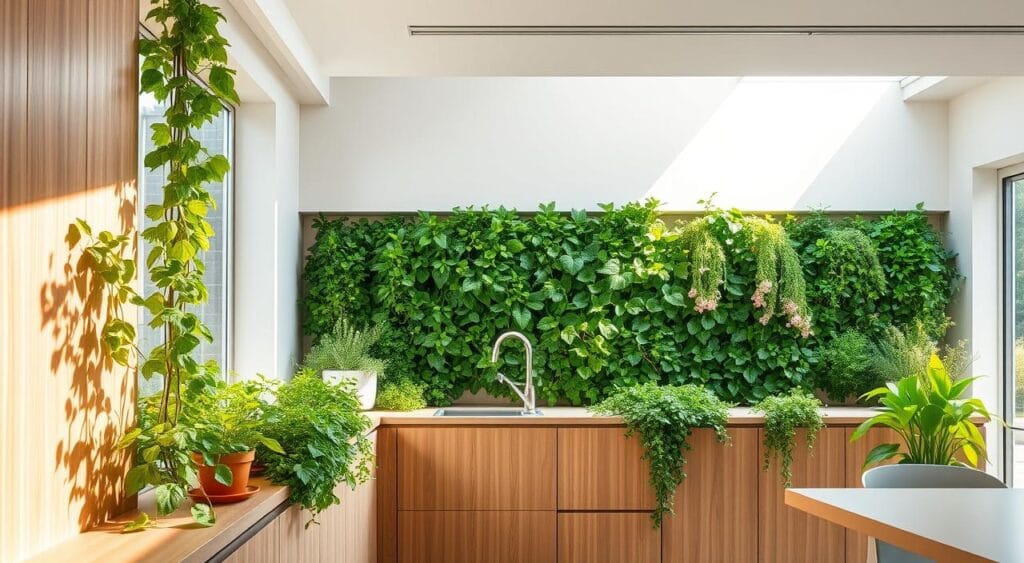
Indoor Plants That Thrive in UK Kitchen Environments
Adding indoor plants to your kitchen does more than clean the air. It also brings in a natural beauty. Here are some plants that do well in UK kitchens:
- Snake plants, known for their low maintenance
- Herbs like basil and mint, which can be used in cooking
- Pothos, a versatile and easy-to-grow climber
Natural Materials and Textures
Using natural materials and textures can make your kitchen more appealing. Think about adding:
- Wooden furniture or accents
- Stone or brick walls
- Natural fiber rugs or mats
Sustainable and Local Options
Choose sustainable and local options for natural materials. This helps the environment and makes your kitchen special.
Herb Gardens and Edible Décor
Having an herb garden or using edible décor is both useful and pretty. Here are some ideas:
- Windowsill herb garden for fresh flavors
- Hanging basket with strawberries or cherry tomatoes
- Decorative bowl with lemons or other citrus fruits
By adding these biophilic design elements, you can make a kitchen that’s not just beautiful but also good for your well-being and happiness.
Creating Functional Zones in Your Kitchen
To make the most of your kitchen, think about dividing it into different zones. This not only makes things more efficient but also makes cooking more enjoyable.
The Work Triangle Concept for Efficiency
The work triangle concept is key in kitchen design. It focuses on the sink, stove, and fridge. By placing these in a triangle, you cut down on walking and save energy while cooking. This layout is great for small kitchens where space is tight.
Social Areas for Family Connection
Creating social spots in your kitchen helps families bond. Think about adding a kitchen island or breakfast bar. It’s a place for family to gather while you cook. It also gives you more space for food prep.
Quiet Corners for Mindfulness and Relaxation
It’s also important to have quiet spots in your kitchen. A small area with a comfy chair and good lighting can be a peaceful retreat. It’s perfect for busy homes where finding quiet is hard.
The British Tea Station: A Happiness Essential
A dedicated tea station is a must-have in many British kitchens. It makes tea time a special, comforting ritual. Add your favourite tea-making items, like a tea infuser and cosy mugs, to make it a true happiness spot.
Multi-Sensory Kitchen Design Approaches
Turning your kitchen into a multi-sensory space can make cooking more fun and fulfilling. A well-designed kitchen engages your senses, making it more inviting.
Aromatherapy and Scent Management
Aromatherapy is key in kitchen design, as smells can stir emotions and boost appetite. Use essential oils in a diffuser or scented candles to add aromas. You can also decorate with herbs like basil or rosemary, which release fragrant scents when touched.
Tactile Elements and Textures
Tactile elements bring warmth and depth to your kitchen. Mixing textures with materials like wood, stone, or metal makes the space more engaging. For example, a wooden island or stone countertop adds natural textures, while metallic accents bring a modern touch.
Sound Design for Kitchen Harmony
Sound design is often missed in kitchen design, but it’s vital for ambiance. Add elements that make pleasant sounds, like a water feature or a ticking clock. In open-plan kitchens, managing sound is key to keeping harmony.
Managing Acoustics in Open-Plan Kitchens
In open-plan kitchens, sound can easily spread, causing noise issues. Use sound-absorbing materials like acoustic panels or soft furnishings to control sound. Placing these elements wisely helps keep your home peaceful.
By using these multi-sensory design methods, you can make your kitchen a place of joy and well-being.
Joy-Inducing Kitchen Gadgets and Tools
Make your kitchen happier by adding gadgets and tools that make cooking fun. The right kitchen gadgets can make cooking easier and more fun. They help you prepare meals quickly and enjoyably.
Time-Saving Devices Worth the Investment
Time-saving kitchen devices can make meal prep easier. Think about getting stand mixers for heavy mixing or immersion blenders for soups and sauces. These gadgets save time and make cooking more fun.
Aesthetically Pleasing Functional Tools
Tools that look good can make your kitchen look better. Choose tools with sleek designs and bright colours that match your kitchen. For example, colourful silicone spatulas or wooden spoons can add elegance to your kitchen.
Smart Technology for Modern British Kitchens
Smart technology is changing how we use our kitchens. Devices like smart slow cookers and Wi-Fi enabled coffee makers let you control your kitchen from afar. This adds convenience to your day. Here’s a look at some popular smart kitchen gadgets:
| Device | Functionality | Price Range |
|---|---|---|
| Smart Slow Cooker | Cooks meals slowly and can be controlled via app | £80-£120 |
| Wi-Fi Enabled Coffee Maker | Schedules and controls coffee brewing remotely | £100-£150 |
| Smart Fridge | Monitors fridge contents and suggests recipes | £1,500-£2,000 |
Adding these joy-inducing kitchen gadgets and tools can make your kitchen happier and more efficient. It becomes a place where you enjoy cooking and spend time.
Seasonal Kitchen Updates for Year-Round Happiness
Seasonal kitchen updates keep your home happy all year. Simple changes with the seasons make your kitchen feel fresh. This keeps it in tune with the time of year.
Quick Décor Swaps for British Seasons
Updating your kitchen with décor swaps is easy. Change your kitchen textiles like tea towels and oven gloves. In spring, choose lighter colours and floral patterns. Autumn and winter are for warmer tones and festive themes.
- Spring: Pastel colours, floral patterns
- Summer: Bright colours, nautical themes
- Autumn: Warm tones, harvest motifs
- Winter: Rich colours, festive decorations
Holiday-Specific Kitchen Enhancements
Holidays are great for special kitchen touches. For Christmas, add festive lighting and holly-patterned ceramics. An Easter centrepiece with spring flowers or themed tableware is lovely.
Budget-Friendly Refresh Ideas
Refreshing your kitchen doesn’t have to cost a lot. Try rearranging accessories, repurposing items, or making your own décor. These ideas are budget-friendly.
Upcycling and Sustainable Approaches
Choosing sustainable approaches is good for the planet and adds a unique touch. Upcycle old jars for herb planters or turn vintage items into decor. This refreshes your kitchen and tells a story.
- Turn old mason jars into herb planters
- Use vintage tea sets as decorative display
- Create a wreath from natural materials like leaves and twigs
By using these seasonal updates and sustainable practices, your kitchen stays fresh and happy all year. It will always feel in tune with the seasons.
Conclusion: Your Happiness-Boosting Kitchen Transformation
A kitchen makeover can really lift your mood. By using dopamine décor, colour psychology, and biophilic design, you can make your kitchen look great and feel uplifting. This can make you happier and more relaxed.
Start your kitchen makeover with small steps. Clear out clutter, pick colours that make you feel good, and add natural touches. These changes will make your kitchen a happier place that shows off your style.
A happy kitchen is more than just pretty. It’s a place where you and your family can enjoy meals together. Follow the tips in this guide to make your kitchen a warm and welcoming space. It will improve your daily life and bring you closer to those you love.

